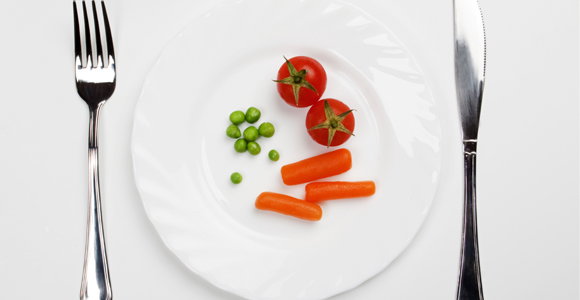The "small-meal" diet has enjoyed years in the spotlight as an easy way to jump-start your metabolism and lose weight without counting a single calorie. But eating more frequently may not be quite the diet solution it's cracked up to be, according to the latest research. Although you shouldn't start eating large meals again if the small-plate plan is working for you, you may want to think twice before embarking on such a program to try and trim down.
The New Study
In a study presented at this year's Society for Endocrinology annual BES conference, researchers followed women who were given five meals on one day, and just two on another day. The calorie count was identical on both days, so meal size and frequency was the only significant difference. Each day, scientists used calorimeters to measure the women's energy expenditure.
The result? The women burned the same number of calories no matter how often they ate throughout the day. In fact, energy expenditure was identical for a full 24 hours.
The One Difference
One thing was different, however: blood-levels of substances called endotoxins were higher in the frequent-meal group. Endotoxins are known to cause inflammation, which has been linked to type-2 diabetes and cardiovascular disease.
While any health risk from eating small meals has yet to be confirmed, the study does suggest that at the end of the day, calorie consumption, not dining frequency, matters most for weight loss. Dietitians and other fitness experts have hammered this point in for years, but unfortunately that hasn't stopped the flurry of fat-loss schemes that promise results without reducing food intake.
The Potential Benefits of the Small Meal Plan
Before discounting the small meal plan entirely, however, it's important to note that consuming a steady food supply does help prevent spikes and crashes in blood sugar, and ensures the stomach never fully empties. These factors may help control hunger, possibly making it easier for some people to reduce calorie consumption.
Ultimately, however, you'll only lose weight by consuming fewer calories than you burn for energy. Each pound of body fat contains 3,500 calories, so you must create that much of a deficit to lose one pound.
Losing Weight Safely and Effectively
To lose weight safely and effectively, create a deficit of 500 to 1,000 calories per day to lose one to two pounds per week. Calorie burning depends on your age, gender, activity level and other factors, but you can get a rough estimate by multiplying your weight times 15. For example, a 140-pound person usually person burns about 2,100 calories per day, and would lose one pound each week eating 1,600 calories per day.
To make dieting less painful, fill up on foods that satisfy you that have fewer calories, such as high-fiber whole grains, fruits, vegetables and lean proteins. For faster results and better muscle tone, you should also fit cardiovascular exercise into your schedule most of the week, and perform weight training at least twice weekly. Follow these guidelines, and you won't need to rely on frequent-eating plans or any other fad diet to finally lose the weight.
How Your Diet Affects Your Metabolism
Nina Kate is a certified fitness nutrition specialist through the National Academy of Sports Medicine (NASM). She also studied journalism at the University of California, Los Angeles (UCLA), and has contributed to numerous major publications as a freelance writer. Nina thrives on sharing nutrition and fitness knowledge to help readers lead healthy, active lives. Visit her wellness blog at BodyFlourish.com.




